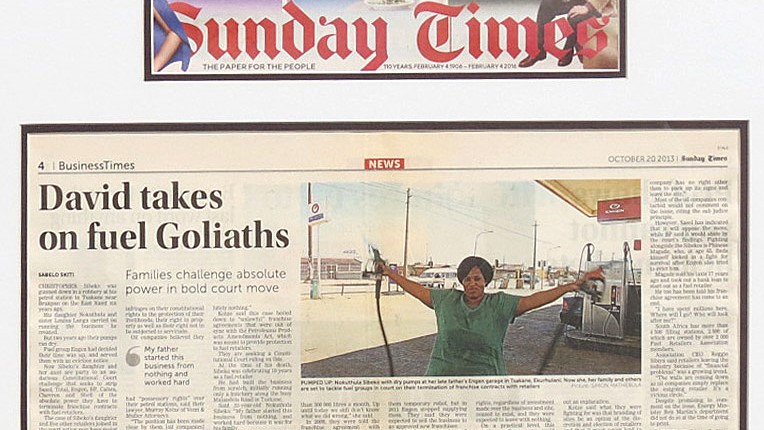David takes on fuel Goliaths
20 October 2013
Families challenge absolute power in bold court move
SABELO SKITI
CHRISTOPHER Sibeko was gunned down in a robbery at his petrol station in Tsakane near Brakpanon the East Rand six years ago. His daughter Nokuthula and sister Louisa Langa carried on running the business he created. But two years ago their pumps ran dry. Fuel group Engen had decided their time was up, and served them with an eviction notice.
Now Sibeko’s daughter and her aunt are party to an audacious Constitutional Court challenge that seeks to strip Sasol, Total, Engen, BP, Caltex, Chevron and Shell of the absolute power they have to terminate franchise contracts with fuel retailers. The case of Sibeko’s daughter and five other retailers joined in the court action may have major ramifications for the industry. In papaers at the Johannesburg High Court, the applicants argue that the business model employed in the country infringes on their constitutional rights to the protection of their livelihoods, their right to property as well as their right not to be subjected to servitude. Oil companies believed they had “possessory rights” over theirpetrol stations, said their lawyer, Murray Kotze of Venn & Muller Attorneys.
“The position has been made clear by them (oil companies) over and over in all cases conducted by them that, basically, the retailers own nothing … if they paid a few million for the business, they still own absolutely nothing.” Kotze said this case boiled down to “unlawful” franchise agreements that were out of sync with the Petroleums Products Amendments Act, which was meant to provide protection to fuel retailers.” They are seeking an Constitutional Court ruling on this.
At the time of his death, Sibeko was celebrating 10 years as a fuel retailer. He had built the business from scratch, initially running only a butchery along the busy Malandela Road in Tsakane. Said 33-year old Nokuthula Sibeko: “My father started this business from nothing, and worked hard because it was for his family. “We are going nowhere. It’s his legacy.”
Her aunt, Langa, said: “We were the highest selling in Tsakane, selling nothing less than 300 000 litres a month. Up until today we still don’t know what we did wrong,” she said. In 2009, they were told the franchise agreement with Engen would end. They said they did not know why. They were given 90 days to pack up.
A legal challenge brought them temporary relief, but in 2011 Engen stopped supplying them. They said they were expected to sell the business to an approved new franchisee. But the family refused to sell the business. Kotze said that when franchise agreements were terminated or lapsed, the retailer’s rights, regardless of investment made over the business and site, ceased to exist, and they were expected to leave with nothing.
On a practical level, this meant an oil company could terminate or refuse to renew contracts of people like the Sibekos, suspend supply, and force them to leave the site without explanation. Kotze said what they were fighting for was that branding of sites be an option at the discretion and election of retailers and that it must never lead to possession over sites by any petrol company. “When franchising agreements come to an end, the petrol company has no right other than to pack up its signs and leave the site.” Most of the oil companies contacted would not comment on the issue, siting the sub judice principle. However, Sasol has indicated that it will oppose the move, while BP said it would abide by the court’s findings. Fighting alongside the Sibekos is Phineas Magade, who at age 65, finds himself locked in a fight for survival after Engen also tried to evict him.
Magade sold his taxis 17 years ago and took out a bank loan to start out as a fuel retailer. He too has been told his franchise agreement has come to an end. “I have spent millions here. Where will I go? Who will look after me?” South Africa has more than 4 500 filling stations, 2 500 of which are owned by over 2 000 Fuel Retailers Association members. Association CEO Reggie Sibiya said retailers leaving the industry because of “financial problems” was a growing trend.
“The walls are coming down as oil companies simply replace the outgoing retailer. It’s a vicious circle.” Despite promising to comment on the issue, Energy Minister Ben Martin’s department did not do so at the time of going to print.
Comment on this: write to letters@businesstimes.co.za or SMS us at 33971
www.timeslive.co.za
…


